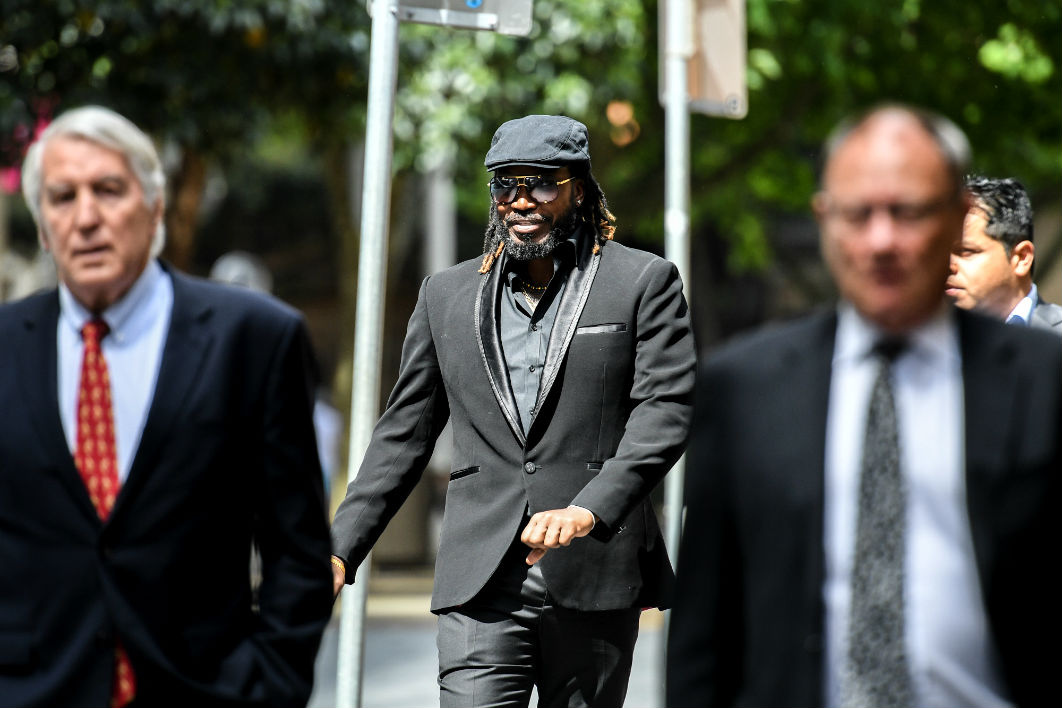West Indies cricketer Chris Gayle’s defamation win against Fairfax this week shows why, despite the Harvey Weinstein–generated tsunami in Hollywood, public allegations of sexual misconduct are relatively rare. Fairfax had alleged Gayle exposed himself to a female massage therapist in the changing room at a training session at Drummoyne Oval during the 2015 World Cup. He sued, and this week the jury backed his claim that the incident never happened. Unless the verdict is overturned, Gayle stands to claim record-breaking damages for injury to his reputation as an international sports star.
In the wake of the Weinstein scandal, the spotlight has turned to other celebrities alleged to be covert sexual harassers, or worse. And not just entertainment figures: Britain’s defence secretary, Michael Fallon, has just resigned over allegations he groped a journalist’s knee. In Australia, journalist Tracey Spicer has announced an investigative project to expose notorious media industry offenders. A global #metoo campaign is encouraging victims of sexual harassment or assault to speak out, with some choosing to name their alleged perpetrators online.
But while there is a sense of public catharsis in the current campaign to publicise alleged sexual misbehaviour by powerful men, the defamation laws remain as they always were. Australia’s are among the strictest defamation laws in the Western world, and unlike in the United States, no “public figure” defence exists to make it more difficult for celebrities or politicians to sue over such allegations.
Sexual misconduct allegations are also particularly difficult to prove. In many workplaces, women and men work closely together. In sports, trainers, massage therapists and physios work in physical proximity to players. Allegations of sexual misconduct often arise where there are few or no witnesses, and consent and intention can be hard to establish. Sometimes the parties agree an incident occurred, but cast the behaviour in different lights; sometimes one party claims an incident occurred, but the other strenuously denies it happened at all, as did Gayle. Unless the perpetrator acknowledges the fact of the incident and asks for public forgiveness (until recently, an extremely rare occurrence), repeating it publicly is a risky step for both accuser and publisher.
The damage to reputation arising out of such allegations can be career-threatening or even career-ending. Harvey Weinstein was swiftly fired from his own company and stripped of industry honours following the accusations of serial sexual harassment and even assault. (Weinstein denies all non-consensual sexual allegations.) Other alleged perpetrators have also seen their reputations and careers plummet overnight as the accusations go viral on social media. Statistically, it is likely that some of them will have been falsely accused or mistakenly identified. The current atmosphere is therefore laying ripe ground for legal actions.
The parties in the Gayle litigation are making submissions on damages, and Fairfax is contemplating an appeal. As a top international cricketer with major level sponsors and brand ambassadorships, Gayle can easily show he has a valuable reputation to protect. He has millions of social media followers, runs his own charity, and recently received a Jamaica Day honour at home. He draws crowds. He has made a fortune travelling the world playing in different competitions. Gayle’s reputation certainly suffered a blow in Australia as a result of the infamous “don’t blush baby” interview with Ten sports journalist Mel McLaughlin (he subsequently apologised and was fined $10,000 by his club), but the Fairfax allegations are in a different league, and it’s likely that sponsors and clubs would been discomforted by them.
For all these reasons, Fairfax could face even higher damages than those awarded against Bauer Media in the recent Rebel Wilson defamation case (also under appeal). Wilson was awarded a record $4.5 million over imputations in magazine articles that she had lied about her age. The court found that the ensuing negative publicity had gone global and may have cost her lucrative roles in upcoming movies. Chris Gayle is much more well-known than Wilson, and the defamatory imputations more serious. Judging from Gayle’s social media, the Fairfax allegations also went worldwide: his followers are certainly celebrating with him now. If Gayle can claim that he lost lucrative global sponsorship offers because of the Fairfax publications, especially given that the jury found the publisher acted unreasonably and with malice, the award could be significant.
For its part, Fairfax may be left arguing that Gayle’s reputation had already been damaged by the Mel McLaughlin interview, the same interview that appears to have prompted Gayle’s accuser to contact Fairfax. •




